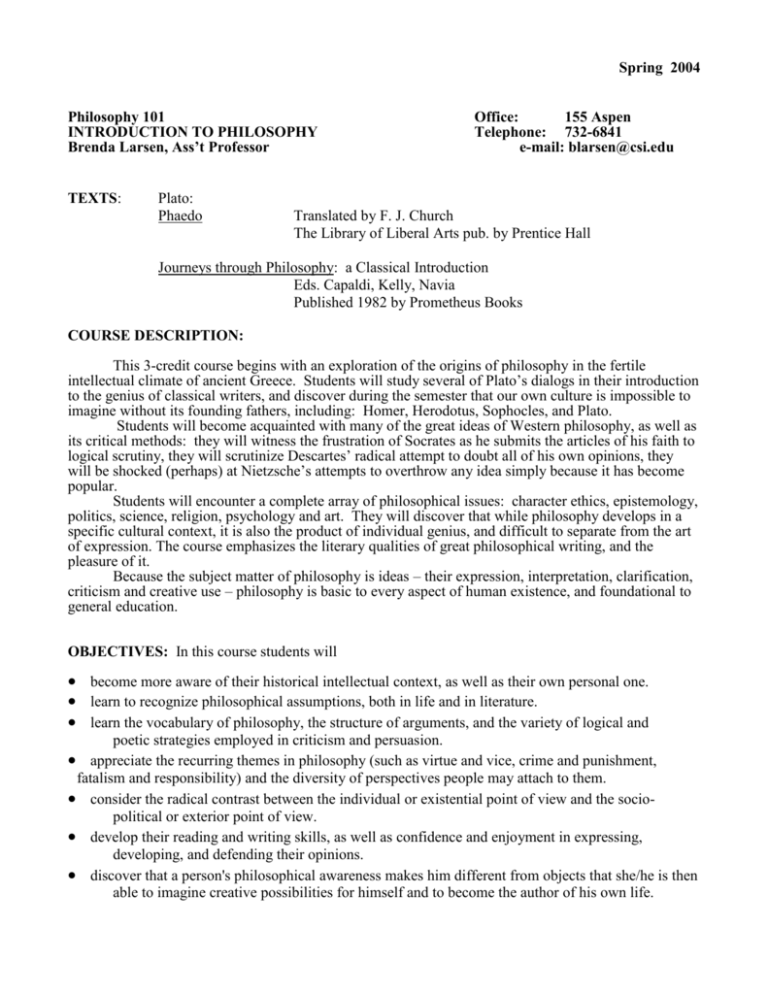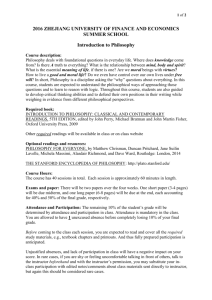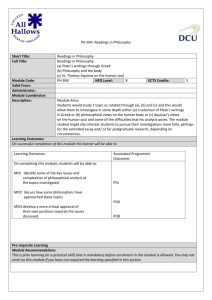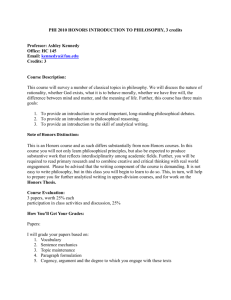Spring 2004
advertisement

Spring 2004 Philosophy 101 INTRODUCTION TO PHILOSOPHY Brenda Larsen, Ass’t Professor TEXTS: Plato: Phaedo Office: 155 Aspen Telephone: 732-6841 e-mail: blarsen@csi.edu Translated by F. J. Church The Library of Liberal Arts pub. by Prentice Hall Journeys through Philosophy: a Classical Introduction Eds. Capaldi, Kelly, Navia Published 1982 by Prometheus Books COURSE DESCRIPTION: This 3-credit course begins with an exploration of the origins of philosophy in the fertile intellectual climate of ancient Greece. Students will study several of Plato’s dialogs in their introduction to the genius of classical writers, and discover during the semester that our own culture is impossible to imagine without its founding fathers, including: Homer, Herodotus, Sophocles, and Plato. Students will become acquainted with many of the great ideas of Western philosophy, as well as its critical methods: they will witness the frustration of Socrates as he submits the articles of his faith to logical scrutiny, they will scrutinize Descartes’ radical attempt to doubt all of his own opinions, they will be shocked (perhaps) at Nietzsche’s attempts to overthrow any idea simply because it has become popular. Students will encounter a complete array of philosophical issues: character ethics, epistemology, politics, science, religion, psychology and art. They will discover that while philosophy develops in a specific cultural context, it is also the product of individual genius, and difficult to separate from the art of expression. The course emphasizes the literary qualities of great philosophical writing, and the pleasure of it. Because the subject matter of philosophy is ideas – their expression, interpretation, clarification, criticism and creative use – philosophy is basic to every aspect of human existence, and foundational to general education. OBJECTIVES: In this course students will become more aware of their historical intellectual context, as well as their own personal one. learn to recognize philosophical assumptions, both in life and in literature. learn the vocabulary of philosophy, the structure of arguments, and the variety of logical and poetic strategies employed in criticism and persuasion. appreciate the recurring themes in philosophy (such as virtue and vice, crime and punishment, fatalism and responsibility) and the diversity of perspectives people may attach to them. consider the radical contrast between the individual or existential point of view and the sociopolitical or exterior point of view. develop their reading and writing skills, as well as confidence and enjoyment in expressing, developing, and defending their opinions. discover that a person's philosophical awareness makes him different from objects that she/he is then able to imagine creative possibilities for himself and to become the author of his own life. METHODS: The instructor will spend some of each class period in lecture, providing necessary background for understanding the literature. The lecture schedule is not rigidly maintained however; students are encouraged to ask questions during lecture, and to even to offer objections. The spirit of dialog prevails in the philosophy classroom. Students will learn both the history of philosophy and how to be philosophical from attending class, reading primary and secondary sources in philosophy, writing essays, doing thought experiments, and interacting with their classmates in philosophical exchange. While class discussion generally concerns the assigned readings, it is not always confined to them; historical, current and occasionally personal events may be appropriate for discussion. Informed, enthusiastic and consistent student participation is necessary for a successful class. Students are expected to attend regularly and to have completed the required reading before discussion begins. REQUIREMENTS and EVALUATION: 80% of your grade will be based written work, 20% on attendance and participation in class. 4-5 short essays: 60% 1 final essay: 20% 3 (variable) ungraded but required writing assignments 10% total earnable points: 110 A = 90-100%, B = 80-89%, C = 70-79%, D = 60-79%, F = below 60% Graded essays should be mechanically correct, clearly written, and well-organized. Your instructor looks for evidence of your genuine engagement with the material, as well as your logical and creative efforts. To receive credit for the class, all graded assignments must be turned in. TOPICS: 1. Introduction to Philosophy What is the Purpose? 2. Socratic Problems Paradox, Myth, and Legend (fathers & sons, the Oracle at Delphi, the new Achilles) Readings: Plato's Euthyphro, Apology 3. Analogy in Ancient Greek Philosophy The state as family, the body as prison house, the philosopher as midwife Readings: Plato’s Crito, Phaedo 4. The Legacy of Socrates Epicureanism, Cynicism, and Stoicism Readings: Variable selections from Epictetus, Seneca, Marcus Aurelius 5. Epistemology Descartes’ Radical Doubt, Autopsy and Skepticism (is life but a dream?) Readings: TBA 6. Political & Economic Philosophy (variable) Plato’s Rebublic & J. J. Rousseau’s Body Politic Aristophanes’ Plutos (the blind god of wealth) & Francis Bacon on Riches Readings: TBA 7. Modern & Ancient Psychology Freud: The Unconscious Mind, Oedipus Conflict, Dream Interpretation Readings: Selections from Sophocles’ Oedipus Rex Lord Arthur Sevile’s Crime, Oscar Wilde (if time permits) 8. Existentialism: Kierkegaard & Nietzsche The Leap of Faith, the Death of God Readings: TBA 9. Radical Freedom and Responsibility Jean Paul Sartre: “I am what I am not. I am not what I am.” Readings: “Existentialism is a Humanism” Plagiarism Policy: Plagiarism may result in failure of this course. Late Policy: One late paper, turned in not more than one week after the due date will be excused. Students who habitually turn papers in late risk having their grade reduced by a full letter. Your professor reserves discretionary power in this matter. Disabilities: Any student with a documented disability may be eligible for related accommodations. Consult you professor for contact information.








